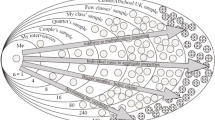Abstract
This paper is in the form of a reflective discussion of the collection of papers in this Special Issue on Statistical reasoning: learning to reason from samples drawing on deliberations arising at the Seventh International Collaboration for Research on Statistical Reasoning, Thinking, and Literacy (SRTL7). It is an important part of the structure of the academic work of SRTL community that at the end of each conference, a small group of discussants are given the space to present their reflections and reactions with the aim of raising questions and issues which may carry forward into the future work of the community of researchers. Traditionally, they have the freedom to choose the perspectives from which they do this, and this paper has been developed in the same spirit. At SRTL7, the authors of this paper addressed issues on which they have been working for some time, namely, task design and the emergence of big data and are now able to offer a commentary from these two perspectives on what might be learnt from the papers in this special issue.
Similar content being viewed by others
Notes
Purpose is used here in a different sense to the one we explain above. At other time they also refer to the “utility” of sampling, but it is unclear whether this usage of the word matches our own.
References
Ainley, J., Pratt, D., & Hansen, A. (2006). Connecting engagement and focus in pedagogic task design. British Educational Research Journal, 32(1), 23–38.
Bakker, A., & Derry, J. (2011). Lessons from inferentialism for statistics education. Mathematical Thinking and Learning, 13(1–2), 5–26.
Brandom, R. (2002). Overcoming a dualism of concepts and causes: A unifying thread in empiricism and the philosophy of mind. In R. Gale (Ed.), The Blackwell guide to metaphysics (pp. 263–281). Hoboken, NJ: Blackwell Publishers Ltd.
Gould, R. (2010). Statistics and the modern student. International Statistical Review, 78(2), 297–315.
Harel, I., & Papert, S. (1991). Constructionism. Norwood, New Jersey: Ablex.
Konold, C. (2002). Teaching concepts rather than conventions. New England Mathematics Journal, 34(2), 69–81.
Konold, C. (2011). TinkerPlots™: Dynamic data exploration. Emeryville, CA: Key Curriculum Press.
Lane, J., Stodden, V., Bender, S., & Nissenbaum, H. (2014). Conceptual framework. In J. Lane, V. Stodden, S. Bender, & H. Nissenbaum (Eds.), Privacy, big data, and the public good: Frameworks for engagement (pp. 1–3). New York, NY: Cambridge University Press.
Nolan, D., & Temple Lang, D. (2010). Computing in the statistics curriculum. The American Statistician, 64(2), 97–107.
Pratt, D., Johnston-Wilder, P., Ainley, J., & Mason, J. (2008). Local and global thinking in statistical inference. Statistics Education Research Journal, 7(2), 107–129.
Ridgway, J., & Smith, A. (2013). Open data, official statistics and statistics education: Threats, and opportunities. Keynote talk: Proceedings of the First Joint International Association for Statistics Education and the Association for Official Statistics, Statistics Education for Progress, Macau. Retrieved from https://www.dur.ac.uk/smart.centre/publications/
Undergraduate Guidelines Workgroup. (2014). American Statistical Association Draft Guidelines for Undergraduate Programs in Statistical Science. October 1, 2014.
Author information
Authors and Affiliations
Corresponding author
Rights and permissions
About this article
Cite this article
Ainley, J., Gould, R. & Pratt, D. Learning to reason from samples: commentary from the perspectives of task design and the emergence of “big data”. Educ Stud Math 88, 405–412 (2015). https://doi.org/10.1007/s10649-015-9592-4
Published:
Issue Date:
DOI: https://doi.org/10.1007/s10649-015-9592-4




